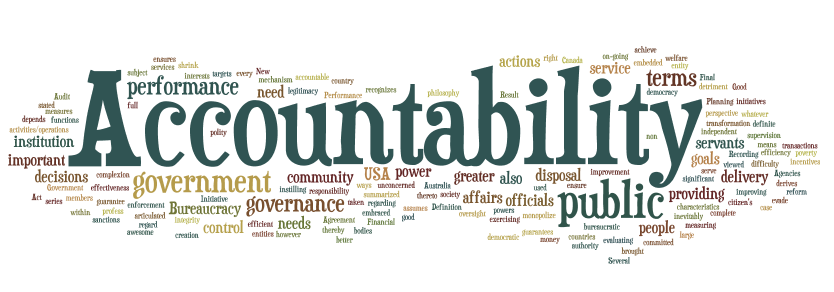Accountability of a Civil Servant
The accountability of civil servants both to ministers and to the Parliament, are constitutional and politically significant. The personal accountability of civil servants and their responsibility towards the society are equally substantial and they are interconnected. In particular their accountability of the actions and the responsibility towards it are prompted by the following progress.
- The increasing complexity of government structure and functions
- Ministerial-civil servant responsibility
- Civil services reforms

Civil servants accountability to the Government
The primary responsibility of the civil service to the people and the society is to serve the government it has elected. This means that civil servants must provide the same standard of free, frank, impartial, and responsive advice, and the same level of professionalism in administration and delivery of services, policies, and programmes, irrespective of the political party in power.
However, at the same time, civil service should be apolitical, performing its functions in an impartial and professional manner. There are also the broader accountability obligations of the civil service which means that the civil service should be openly accountable for all its actions, within the framework of ministerial responsibility, to the government and to the legislature.
The governmental system in India provides a model of accountability in which public interest is very clearly articulated. It is the government and the ministers who determine the public Interest in terms of policies and programme priorities, and civil servants, within the requirement of the constitutional and legal framework, advise on and implement their decisions.
Therefore, the civil service has a particular responsibility for the public interest in upholding the law and ensuring that proper procedures arc followed. As far as the political system is concerned, the civil service needs to see itself as a career based service to enhance the effectiveness and cohesion of India’s democratic system of government.
Civil servants responsibility towards the people and the society
The civil service has a close relationship with the society through the variety of services it provides. This means that the maintenance of ethical behaviour by civil servants in dealing with the public is particularly important.
The civil service needs to serve the society by ensuring that the entitlements and services provided to it under law and government policy are delivered effectively, fairly, courteously, and professionally.
Civil servants also need to be responsive to the needs of the public, treating its members with courtesy and with sensitivity to their rights and aspirations. This means that civil servants should be professional and effective in the delivery of services.
Responsiveness also means that while a civil servant cannot make exceptions in individual cases where these are not sanctioned by law, and while the civil servant must ensure equality of access for all citizens, he/she should try to be responsive as he/she administers entitlements or provide services and to avoid unnecessary rigidity.
This would also require a civil service that is sensitive to the diversity of the Indian public and in particular, to the needs and requirements of the weaker sections of the society. On the whole, civil servants should deliver services fairly, effectively, impartially, and courteously to die members of the public.
Conceptualization of a good administration by World Bank
The World Bank has laid certain principles in this context to conceptualise good administration, they include
- Setting objectives
- A dignified approach to protect personal dignity.
- Setting up monitoring systems.
- Promotion of citizen participation as a way of achieving greater transparency, democracy, equality, and sound administration, especially in relation to general decisions affecting groups of unknown people
- Enhancing transparency and accountability.
- Devising performance indicators
- Introducing assessment,
- Seeking the best ways of securing the best results
- Improved legitimacy
- Instrumental functions like protection of rights and interests and the promotion of good governance.
Principles for managing ethics in public service by United Nations
The United Nations System has also been active, with the General Assembly adopting resolutions on public service ethics.
- A public official holds a position of trust, to act in the public interest. They need to know the basic principles and standards they are expected to apply to their work and where the boundaries of acceptable behaviour lie. They should be expressed through the code of conduct to be followed throughout the profession.
- Public officials should ensure that they perform their duties and functions efficiently, effectively and with integrity, in accordance with laws or administrative policies for which they are responsible are administered in the most effective and efficient manner.
- Public officials should be attentive, fair and impartial in the performance of their functions and, in particular, in their relations with the public.
- Public officials should not use their official authority for the improper advancement of their own or their family’s personal or financial interest.
- In situations of possible or perceived conflict of interest between the duties and private interests of public officials, they should comply with the measures established to reduce or eliminate such conflict of interest.
- Public officials shouldn’t misuse information acquired officially and should interact clearly with the public.
- Public officials should comply with measures established by law which contains ethical standards in it.
- The political or other activity of public officials outside the scope of their office should be in accordance with laws and administrative policies, not be such as to impair public confidence in the impartial performance of their functions and duties.


